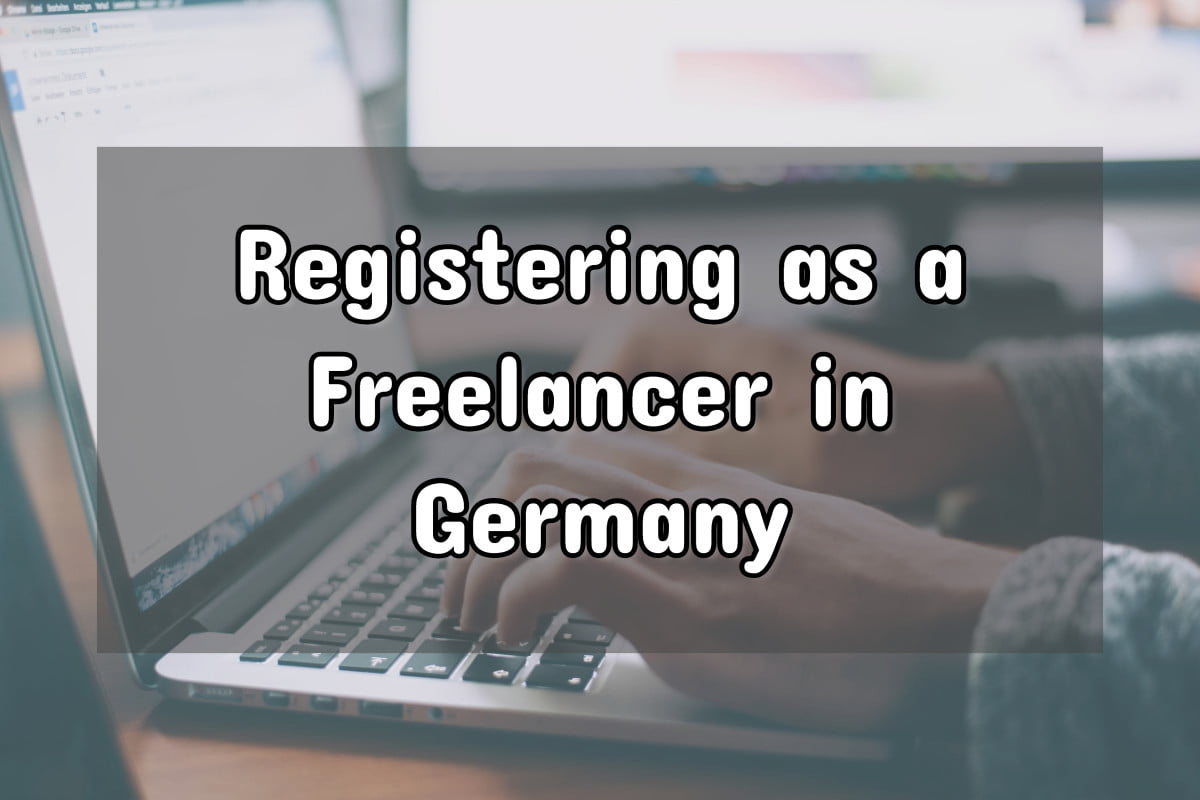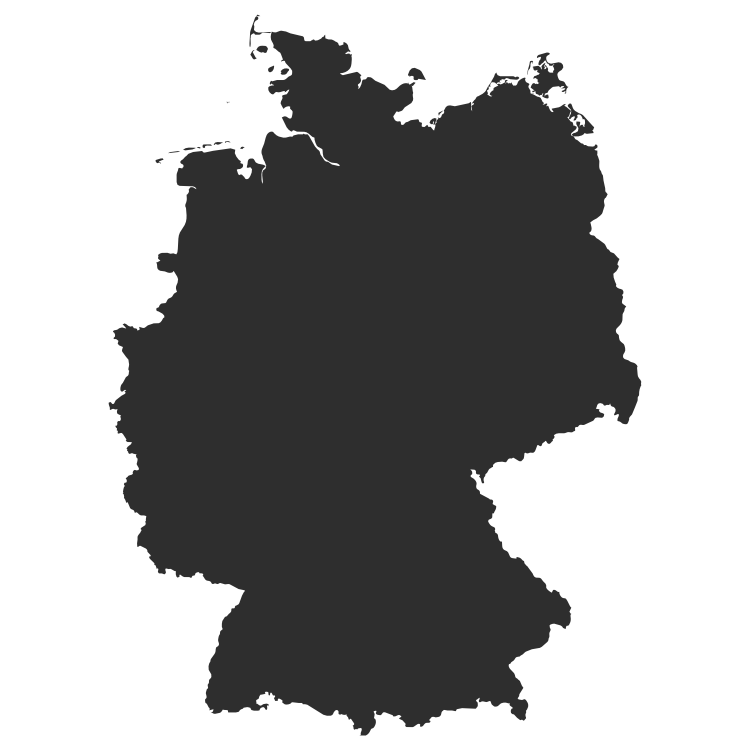You’re able to register as a freelancer in Germany even if you don’t have permanent residency.
Temporary residence permit holders may need to make a trip to the Ausländerbehörde though, to have freelancing or self-employment added to your Aufenthaltserlaubnis.
You should also know that there’s a subtle – but very important – difference between what the Germans classify as freelancing versus self-employment.
Should you register as a freelancer in Germany, or are you self-employed?
In Germany, only a certain number of (fairly traditional) professions are considered freelance professions.
The German term is Freie Befufe for the job titles, or Freiberufler referring to the person themselves.
If you work in one of these fields, then congratulations, you qualify as a freelancer, according to German tax law and the Institut der Freien Berufe.
- Artists
- Graphic designers
- Medical professions i.e. doctors, dentists, midwives, practitioners of alternative medicine, psychologists, physiotherapists and occupational therapists
- Teachers (including Kindergarten / Nursery)
- Coaches
- Consultants
- Translators and Interpreters
- Photographers
- Authors, writers and journalists (including bloggers, as long as you do not sell digital downloads)
- Authorised experts – for example quality auditors, health & safety inspectors
- Tax advisors
- Lawyers and Notaries
- Architects
- Engineers – this can also include IT-related professions under certain conditions
Not covered under these professions? Then you can’t register as a freelancer in Germany
Instead, it is classed as a “standard” trade, and must be registered as a Gewerbe, or sole-trader business, rather than a freiberufliche Tätigkeit, or freelance activity.
This does, unfortunately, mean you’ll have a few more hoops vs. the registration process for a freelancer.
Perhaps you’re even considering moving to Germany to get a residence permit as a freelancer or self-employed person.
We cover everything you need to know about moving to Germany and obtaining the freelancer visa.
Register as a Freelancer in Germany (Freiberufler)
If you’re a freelancer, then the actual registration process is easy:
First of all, you need to fill out the form Fragebogen zur Steuerlichen Erfassung, which can be downloaded from the Bundesfinanzministerium website here.
Take (or post) this to your local Finanzamt.
Wait 1-2 weeks (in most cases) and you will then receive your tax number.
You are then legally eligible to start trading.
HOWEVER, make sure you read the other requirements below, as some of them could prove vital.
Register as a Sole Trader in Germany (Gewerbetreibender / Einzelunternehmer)
If your business activity doesn’t fall under the professions considered as freelance, then there are a few more hurdles to jump through. Don’t worry though, none of this is particularly difficult. It’s just administrative hassle that Germany is unfortunately famous for.
You’ll first of all need to register your business.
We’ve broken the necessary steps down one-by-one so you can keep on top of your progress.
Step 1: Collect your documents
Before you register, you should collect all the necessary documents:
- Identity card or passport
- Your Meldebescheinigung
- Any relevant qualifications / certificates
Depending on your specialisation, you might also need:
- Master craftsman’s certificate
- Police clearance certificate
- Health certificate
You can find out exactly which documents your trade requires by checking out the Chamber of Commerce (IHK) website for the city or region you’re registering in.
The forms you need to fill out for the popular cities are linked to below:
Step 2: Complete the registration form
Each municipality may have a slightly different process, because businesses are registered with the local town or city council as opposed to a central, national companies register.
Online registration isn’t available everywhere, but some cities (Berlin included) offer this.
If your online application succeeds, you’ll be able to print out a receipt. In most cases, you have to sign a copy of this and send it to the authorities to make your business registration legally binding.
Another bonus with online registration is that your information is automatically forwarded to other offices such as the tax office, the IHK or HWK.
This saves you another job down the line.
However, there are advantages to visiting the offices in person, too.
Sitting down with a clerk, face-to-face, means there’ll be someone there to help you. They can assist you with the forms and answer any questions you might have.
Although that said, you will need to speak German or take someone with you who can.
Step 3: Fill out your tax form
Once you have your business licence, you should automatically receive a form from the tax office, known as the Fragebogen zur Steuerlichen Erfassung.
If you don’t receive this automatically, it can be downloaded from the Bundesfinanzministerium website here.
Once this form is completed, you can take (or post) it to your local Finanzamt.
You’ll then need to wait 1-2 weeks (in most cases) and you will then receive your tax number.
Step 4: Fill out the registration form of the IHK or HWK
As a trader, you’re also required to become a member of either the Chamber of Industry and Commerce (IHK) or the Chamber of Crafts (HWK).
Which one you’re obliged to join will depend on your profession.
You should also receive a tax registration form from the IHK or HWK, requiring information on your company and projected income.
You should always provide the information correctly and as precisely as possible. It could well save you money – their membership fees differ based on business size.
What do I need to do after registering my business?
Congratulations! You are now legally eligible to start trading.
However, there are several other things to consider before you start. Make sure you read the other important requirements below before you jump in with both feet…
Open a business bank account
If you haven’t already opened one, you will need a business bank account for your expenses and payments.
N26 offers a convenient and easy-to-open bank account for freelancers and solopreneurs.
Theoretically, you can use your personal bank account to run your business, but it’s going to be a huge pain separating business from personal expenses.
Get personal liability insurance
You will also need to have liability insurance that covers your business activity. Because you’re a freelancer, you are your business and you’re personally liable.
You’re not running a limited company.
Registering a limited liability company in Germany (Gesellschaft mit begrenzter Haftung, or GmbH for short) is a very expensive and bureaucratic process, and you’re unlikely to go down this route unless you’re a startup founder.
Do you need to register for VAT (Mehrwertsteuer)?
VAT is an administrative hassle because it has to be filed each quarter.
You need to register for VAT if your business is expected to turn over more than €22,000 per full calendar year. If you start your business mid-way through a year, then that figure is prorated.
You can opt NOT to register but then if you cross the threshold you could unwittingly be left high and dry with an unexpected VAT bill that you can’t go back and recover from your customers, especially if you’re selling to individuals rather than businesses.
VAT in Germany is known as Umsatzsteuer, or Mehrwertsteuer, and is levied as a sales tax at 19% on goods and services sold.
There are some exceptions (such as hospitality and catering) which enjoy a lower VAT rate of 7%.
As part of the German government’s economic stimulus to Covid-19, the VAT rate has been temporarily reduced to 16% until the end of 2020, and the reduced rate from 7% to 5% until the end of June 2021.
I would strongly recommend you speak to a tax advisor before making any rash decision on whether or not to register for VAT.
If you’re confident that your business will grow pretty fast or you already have a good pipeline of work lined up, you’re better off registering from the outset.
If your business is a side hustle, then you’re probably unlikely to cross the threshold for registration.
The VAT rules apply to both those who register as a freelancer in Germany, as well as those considered as sole trader businesses.
Do I need an accountant?
Yes, you do.
There is a difference in Germany between a bookkeeper (Buchhalter) and accountant / tax advisor (Steuerberater).
Bookkeepers are more administrative in nature. Think more like an admin assistant who is good with numbers and understands a little bit about how the day-to-day running of tax affairs works. Much of what they do these days can be substituted by software.
Accountants, on the other hand, are highly trained professionals who can save you a lot of money in taxes. They will also submit your VAT records to the Finanzamt each quarter for you.
You’ll be able to find English speaking accountants and tax advisors in all major German cities. Out in the sticks it’s less common and you may have to seek one out in your nearest large city.
A bookkeeper is a nice-to-have, whereas an accountant is going to be a must-have.
Employees don’t have to submit tax returns whereas businesses, obviously, do!
Conclusion
Getting started with your own freelance or sole trader business is fairly straightforward, but the registration process isn’t as easy as in the US, UK and other more business friendly countries. You won’t be up and running in a couple of days.
The local chambers of commerce (for sole traders) and the Insitut der freien Berufe or Bundesverband der Freien Berufe (for freelancers) offer lots of training and courses around the topic of running a business in Germany.
You’ll likely need some help from an accountant and a lawyer along the way too, once you have clients and you start to grow your business.
Disclaimer: This is not meant to be a comprehensive guide to running a business.
We’ve just covered the things that you need to take care of in the initial stages of registering, to the point where you’re fit to start trading.











